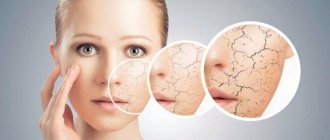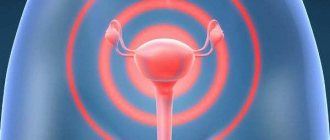“Blush” or rosacea during pregnancy
Due to increased blood circulation, a rather bright blush may appear on the cheeks. If the blood vessels are weak, then instead of a healthy blush, a small vascular network appears, creating the effect of reddened, inflamed skin. To resist rosacea, strengthen blood vessels.
Use contrasting washes and choose cosmetics with anti-rosacea components. Look on the labels for extracts of horse chestnut, grape leaves, blueberries, red tea (rooibos), gingko biloba, sweet clover, chamomile, cornflower, calendula, linden, grape seed oil, algae, aloe, bisabolol, panthenol, vitamin E.
Unusual signs of pregnancy
When a woman begins to show the first signs of pregnancy, it causes joyful excitement among the whole family. After all, this means that soon you will have a long-awaited baby.
Let's look at what unusual signs can be a harbinger of pregnancy:
• Begins to get sick and feel dizzy often. Migraines occur more often than usual.
• There is a metallic taste in the mouth. • Flatulence. • Lower back hurts. • Constipation. • Constantly want to sleep. • You get tired quickly. • All receptors (vision, hearing, smell) become more acute. • Change in taste preferences. • Swelling of the legs. • Redness and itching of the skin. • Veins in the chest area become inflated. • A healthy glow appears. • The “path” from the navel to the bottom darkens. • The nipples become noticeably darker. • New growths appear in the form of moles and pigmentation. And the existing ones can increase significantly.
These lists of signs show what a pregnant woman may actually encounter.
If any symptoms cause you concern, a mandatory consultation with your gynecologist is necessary.
Pigmentation on the face during pregnancy
Due to hormonal changes during pregnancy, pigmentation often occurs. As a rule, it appears in the corners of the eyes and above the upper lip.
Important! Many whitening cosmetic ingredients (kojic acid, arbutin, hydroquinone) are very active. They are extremely undesirable for pregnant women.
To prevent pigmentation during pregnancy:
- do not sunbathe;
- be sure to use SPF protection 30+.
Important! Ideally, the filters should be physical (zinc oxide and titanium dioxide). Chemical filters one way or another cause a chemical reaction in the body, the effect of which on the baby has been studied little.
Finding a face cream with only physical filters is difficult, but possible. Look for children's cosmetics, organics and pharmacy products for sensitive skin.
You can also use mineral powder with physical filters on top of day cream as SPF. The main thing is that it has a high protection factor, and you update the powder every couple of hours.
After childbirth or the end of lactation, pigmentation that appeared during pregnancy often goes away on its own. And if suddenly it remains, then you can safely use whitening cosmetics, peelings and even laser. In the meantime, cover up the spots that appear with a mineral concealer.
External changes
It may be different for every pregnant woman; Moreover, such changes are almost always recorded by close people, and not by the woman herself.
- acne (hormones actively change their ratio, so skin problems are likely to occur, even in the absence of acne and pimples in the past)
- swelling of the limbs and face (in the morning we usually have a slightly swollen face, and during pregnancy this feature can be present all day; if you clench your hands into fists, you will notice that they are swollen and increased in size)
- appearance of a venous pattern on the chest
- constipation and accumulation of gases in the intestines (these processes, again, are not due to hormonal changes; the intestinal walls will swell, and intestinal function will slow down slightly)
- an increase in the size of the mammary glands (already in the first month of pregnancy, the breasts may increase in size or even more, but this is not necessary; in some women the glands swell only towards the middle of the gestation period)
- darkening of the skin surrounding the nipples (can be more or less pronounced)
- blush on the cheeks (becomes more pronounced in the evening in the early stages of pregnancy)
- darkening of the linea alba
Acne on the face during pregnancy
The two main causes of acne (exacerbation):
- hormonal changes in the body;
- the liver cannot cope with the increased load, and some of the toxins are eliminated through the skin.
Often, hated acne appears not only on the face, but on the shoulders, back, chest and even stomach.
All this is sad, ☹ but don’t despair. Most often, in the second trimester, the body adapts, and the number of rashes is noticeably reduced or they disappear completely.
Important! Most traditional anti-acne ingredients are too active and are contraindicated for pregnant women. Among them are triclosan, camphor, salicylic acid. Therefore, if you want to use anti-acne cosmetics during pregnancy, you need to carefully read the ingredients. If in doubt, don't buy it.
In addition, if acne appeared during pregnancy, then the cause is most often “internal” and external cosmetic influences will be practically useless.
So, it is impossible to defeat acne during pregnancy using cosmetic forces, but you can improve the appearance of the skin with the help of mild sebum-regulating and cleansing components: zinc, kaolin (white clay), tea tree.
And the first way to combat acne during pregnancy is to drink plenty of fluids. 3 liters of fluid a day will help the body remove toxins and dilute the concentration of hormones.
The work of the sebaceous glands is activated by fried, hot, spicy foods, sweet carbonated drinks, and chocolate. Limiting these foods in the diet will have a beneficial effect not only on the condition of the skin, but also on the course of pregnancy.
And don’t forget the main rule for problem skin - do not press under any circumstances! The old song about the main thing about the fact that you can get an infection is already known to everyone. We will add one more argument for credibility: when squeezing, the skin’s immunity is dealt a blow, the process of formation of new tissue is disrupted and, as a result, post-acne spots appear.
Clay masks will be a good helper for oily and problem skin during pregnancy. They will dry the skin, deeply cleanse and remove inflammation. It is best to use powder masks, not ready-made ones, that contain clay and nothing but clay. You can add 1 drop of tea tree essential oil to the mask yourself - a good natural anti-inflammatory component that is not contraindicated in small quantities for pregnant women. The mask can be applied not only to the face, but also to the entire area of the rash and left until completely dry.
Subjective sensations
Dramatic changes immediately occur in the body. Nothing can be seen in the abdomen yet, but subjective sensations are more likely to be present. The signs mentioned below will be present in ladies who are prone to PMS. Therefore, women often confuse pregnancy and premenstrual signals.
Malaise
In the first days after conception, a woman may feel slightly unwell. She may think that these are harbingers of ARVI (symptoms that appear some time before respiratory symptoms and before an increase in body temperature). A woman gets tired quickly, even if she hasn’t done anything hard.
Changes in emotions
Changes in mood and outbursts of emotions for no particular reason can also indicate pregnancy. Tears may come along with laughter for minor reasons. The desire to cry and feel sorry for oneself can quickly give way to euphoria. This is observed in the first weeks of pregnancy in emotional women, rather in melancholic and choleric people.
Drowsiness and restless sleep
In the first days after conception, you may be tormented by a constant desire to sleep. After a long night's sleep, you may feel like you haven't gotten enough sleep. A woman may wake up suddenly in the morning, too early in the morning, and be unable to go back to sleep. If only this symptom is present, it is easy to confuse it with another condition and not even think about pregnancy.
Change in libido
A change in sexual desire in one direction or another is typical from the second week or later of pregnancy. This is due to hormonal changes in the body.
Heaviness in the pelvis
Blood flows to the pelvis to ensure the development of the fetus. And therefore there is a feeling of fullness and heaviness in the pelvic area. A woman may feel like she can physically feel her uterus.
Other typical signs:
- tingling in the uterine area (low intensity)
- lumbar pain (shooting), radiating to the lower extremities
- migraine or headache (sometimes long-lasting)
- breast tenderness or, conversely, loss of sensitivity (the second sign will be more likely in those who had increased sensitivity of the glands during PMS)
- chills and fever (the feeling of “being thrown into a fever” may appear 3-4 or more times a day)
- strong cravings for certain foods or increased appetite (a woman may want something she has not eaten or disliked before)
- nausea (nausea in the morning and the most severe, vomiting is possible; this is a typical sign of toxicosis in the first trimester of pregnancy)
- perversion of smell (a woman may like the smell of paint, nail remover, even if this has not been observed before; this is a very early sign of pregnancy)
- increased sensitivity to odors
- difficulty in sitting posture (the woman will feel uncomfortable sitting and will constantly try to change her body position)
Facial swelling during pregnancy
Swelling is common in expectant mothers, especially in recent months. This is due to poor circulation and the body’s great need for fluid.
To combat swelling, try to drink 3 liters of fluid per day. The seemingly logical restriction of fluid is a mistake, since the body, with a lack of moisture, begins to store it in even greater quantities.
In addition, you should limit fried, hot, spicy foods, sweet carbonated drinks, chocolate and coffee. These products contribute to fluid retention in the body.
Pregnant women should limit their fluid intake only on the advice of a doctor. In addition, if you have severe swelling, different sides swell alternately, consult your doctor immediately.
To relieve mild swelling on the face during pregnancy, use:
- contrasting washes;
- cold compresses;
- cooling masks (for example, with menthol).
For puffy eyes, special cooling gels and caffeine rollers will be helpful.
Physiological and laboratory changes
Physiological changes often push a woman to visit a gynecologist or other doctor when she is not yet aware of her pregnancy. An early pregnancy factor is a substance that is found in the blood and mucus of the cervix within a day or two after conception. But this factor is found through special studies only in 67 cases out of 100.
The pregnancy factor increases in the first 3 months of bearing a child. Some specialists use this indicator to detect pregnancy, but this cannot be said to be a widespread practice. There is also hCG - human chorionic gonadotropin. This is a hormone that is produced normally in pregnant women and changes from month to month. In the first week from conception, its amount is 25-156 mU/ml, and in the fifth or sixth week it is 23,100-151,000 mU/ml.
Discharge of blood from the vagina, which occurs on the 7-12th day from conception, indicates that the fertilized egg has implanted in the uterus. This is not a flow of blood, but rather a spotting that may have a pink or yellowish tint. Also in the early stages of pregnancy, signs may include bleeding from the cervix if the woman had erosion before pregnancy.
A typical early sign of pregnancy is exacerbation of hemorrhoids if there is a history of this disease. This is explained by the active flow of blood into the pelvis. If a woman constantly measures her basal temperature for the purpose of conception, she will notice that in the first weeks the temperature rises to more than 37 degrees Celsius. If conception does not happen, before menstruation the temperature will be 36.6-36.8 degrees. An increase in temperature during a delay can indicate not only pregnancy, but also late ovulation.
The first stages of pregnancy also have such a sign as cramps in the calves. Convulsions occur at night, and the woman wakes up from this. This symptom is clearly manifested in those who have very low blood pressure. Associated symptoms may include weakness, dizziness and, very rarely, fainting. Convulsions can occur when a woman travels in stuffy transport, stands for a long time, etc.
In the second phase, the basal temperature will be reduced literally for one day. This can only be noticed if you measure this temperature regularly. Reduced immunity, as is known, is also characteristic of pregnant women. This is necessary so that the mother’s body does not mistake the embryo for a foreign body and does not try to get rid of it. As a result, the woman may have a slight runny nose.
An early sign of pregnancy may be increased drooling. At the same time, nausea appears, and the woman tolerates early toxicosis even worse. Discharge begins from the vagina, the reason, again, is the filling of the pelvic vessels with blood. Candida fungi begin to multiply, which is why thrush often occurs in women in the first trimester. If you begin to discharge a curd-like consistency, and your genitals itch inside or outside, you should consult a doctor. Thrush cannot be ignored and left untreated, especially during pregnancy.
When a woman becomes pregnant, she begins to go to the toilet more often. In the early stages, the kidneys work actively, and the amount of hormones also increases. Therefore, you may want to go to the toilet even in the middle of the night.
The above listed signs of the first stages of pregnancy do not depend on the race or age of the woman. Emotional pregnant women are more likely to notice one or more of the early signs of conception. Also obvious symptoms are typical for the first pregnancy. When carrying a second or third child, you may not suspect it for a long time, especially if a woman is used to having an irregular menstrual cycle.
The onset of conception is suspected by women who have chronic diseases of the “female sphere”. They experience increased pain in the appendages and lower back, so they can understand that they are pregnant already in the first days.
Signs of pregnancy with a boy
There are many folk signs that guarantee the appearance of a son in the family. Previously, our mothers, grandmothers and great-grandmothers, did not have high-tech ultrasound machines, and they learned to determine the sex of the unborn child by special changes in their body. After many decades, many women still try to determine who will be born to them.
How can we understand that we are expecting a boy?
• The belly clearly protrudes forward; from the back, pregnancy is practically invisible, that is, the sides are not rounded. • Mom begins to look fresher and more attractive than before pregnancy. • The nose stands out noticeably against the background of the entire face. • Extremities become cold regardless of the time of year and room temperature. • Increase in hair growth. • Minimum whims, and mostly excellent mood throughout pregnancy. • Pregnancy occurred after the middle of the cycle. This fact means that there was a significant predominance of male hormones.
Hives
Often, hives (urticaria) that a woman has previously suffered from even improve during pregnancy. 11 But not always. Therefore, although it is less common than other skin changes described above, it is still quite common. 12
This rash is raised, the areas are swollen and very itchy. They are caused when your body produces histamine in response to certain factors, such as a change in temperature, a substance you are allergic to, or an infection. Hives can appear on any part of your body, and can come and go in just a few hours to a few days. It is easily treated with an oral antihistamine.
When to expect the first signs
All women who strive to become mothers listen to their bodies from the first days, trying to catch the first signs of pregnancy.
We hasten to please you that the wait is not long at all; after the first week of pregnancy, you will begin to feel changes in your body. Changes in the mother’s body will be noticeable not only to the expectant mother, but to those around her.
But there are also such rare cases, accompanied by bleeding, that a woman does not know about her interesting situation even in the fourth month of pregnancy.
Proper care is the key to health and beauty
Pregnancy and childbirth are a big test for the face. Under the influence of hormonal changes, the skin becomes more sensitive, loses natural moisture and quickly fades. Therefore, it must be constantly moistened. After all, even on oily or normal skin there can be dry areas. Naturally, the moisturizer should match your skin type. But when choosing cosmetics, it is necessary to take into account that during pregnancy and after childbirth, skin type may change slightly - depending on external factors, lifestyle and health.
At the same time, as a result of hormonal imbalance, hyperfunction of the sebaceous gland is observed and a sharp increase in sebum production occurs. Excess fat accumulates in the pores and closes them, which creates favorable conditions for the proliferation of bacteria and the formation of inflammatory processes. Even women with dry skin may experience acne and oily skin. In this case, it is better to replace the usual cream powder with dry, crumbly powder. It does not contain a greasy binder and absorbs excess sebum well. If you are used to carefully masking defects, then choose a transparent foundation with a light texture and a concealer pencil. This foundation does not lie on the face like an artificial mask, but looks natural. Just apply the tone sparingly and blend thoroughly with a special swab, otherwise excess cream will accumulate in the folds. And to correct makeup during the day, it is convenient to use special mattifying wipes that absorb greasy shine, but do not spoil the makeup.











